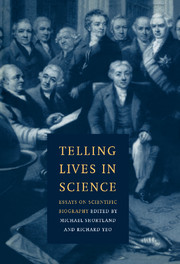Book contents
- Frontmatter
- Contents
- List of contributors
- Preface
- Introduction
- 1 Existential projects and existential choice in science: science biography as an edifying genre
- 2 Life-paths: autobiography, science and the French Revolution
- 3 From science to wisdom: Humphry Davy's life
- 4 Robert Boyle and the dilemma of biography in the age of the Scientific Revolution
- 5 Alphabetical lives: scientific biography in historical dictionaries and encyclopaedias
- 6 The scientist as hero: public images of Michael Faraday
- 7 ‘Tactful organising and executive power’: biographies of Florence Nightingale for girls
- 8 Taking histories, medical lives: Thomas Beddoes and biography
- 9 The scientist as patron and patriotic symbol: the changing reputation of Sir Joseph Banks
- 10 Metabiographical reflections on Charles Darwin
- Index
4 - Robert Boyle and the dilemma of biography in the age of the Scientific Revolution
Published online by Cambridge University Press: 28 October 2009
- Frontmatter
- Contents
- List of contributors
- Preface
- Introduction
- 1 Existential projects and existential choice in science: science biography as an edifying genre
- 2 Life-paths: autobiography, science and the French Revolution
- 3 From science to wisdom: Humphry Davy's life
- 4 Robert Boyle and the dilemma of biography in the age of the Scientific Revolution
- 5 Alphabetical lives: scientific biography in historical dictionaries and encyclopaedias
- 6 The scientist as hero: public images of Michael Faraday
- 7 ‘Tactful organising and executive power’: biographies of Florence Nightingale for girls
- 8 Taking histories, medical lives: Thomas Beddoes and biography
- 9 The scientist as patron and patriotic symbol: the changing reputation of Sir Joseph Banks
- 10 Metabiographical reflections on Charles Darwin
- Index
Summary
This is the story of a life of Robert Boyle that was never written, with reflections on the significance of this paradox for our understanding both of Boyle and of the nature of scientific biography in his day. In fact, of course, we have two biographical accounts of Boyle dating from the sixty years following his death, on which almost all subsequent writings on him have been based. One was the sermon preached at Boyle's funeral on 7 January 1692 by his friend, Gilbert Burnet, Bishop of Salisbury, which included a lengthy section described at the time as a ‘Panegyric’ of Boyle. As one might expect of a funeral sermon – a genre in which Burnet specialised – this is an unashamed eulogy of Boyle, with something in common with the various verse ‘elogiesy’ of the deceased scientist that were produced in the aftermath of his death. In it, Burnet drew on his intimate knowledge of Boyle (and on biographical notes that had been vouchsafed him) to paint a memorable but rather onesided view of the great natural philosopher as a truly good man, pious, sober, modest, painstaking and intellectually innovative. His aim was to illustrate ‘to how vast a Sublimity the Christian Religion can raise a mind, that does both throughly believe it, and is entirely governed by it’. In many ways, this image has dominated perceptions of Boyle ever since.
- Type
- Chapter
- Information
- Telling Lives in ScienceEssays on Scientific Biography, pp. 115 - 138Publisher: Cambridge University PressPrint publication year: 1996
- 1
- Cited by



